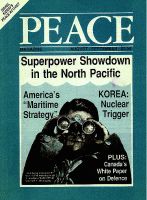
Peace Magazine Aug-Sep 1987, page 39. Some rights reserved.
Search for other articles by Annabel Cathrall here
Reported by Annabel Cathrall
Reg Whitaker, a professor of political science at York University, is studying the plight of refugees from war-torn countries. The following is a precis of his lecture given in April.
Since the end of World War II it is estimated that at least 70 million people have been forced to move because of political conditions. The current refugee population is estimated at twenty-one million, of whom about ten million have been displaced across national boundaries. Before World War II the refugee problem was largely European: a result of World War I. Now it is a world wide disaster. Half the world's refugees are in Africa. A chronic refugee problem has festered in the Middle East for 40 years. A huge outflow from Southeast Asia has abated, perhaps only temporarily. The war in Afghanistan and other problems have caused a refugee buildup in Pakistan and India. In Central America one million people have been displaced. In the past two or three years the numbers have increased alarmingly. At this point, just as happened in the late 1930s, the doors to refuge are closing in Europe, the U.S., Canada and elsewhere.
Whitaker pointed out that there were few mass movements of refugees until this century; now they are a permanent feature of global politics. There is a tendency to think of refugees strictly in humanitarian terms, to focus on their immediate physical needs without bothering to think about the causes of the problem. Few refugees are victims of natural disasters. People are turned into refugees by deliberate persecution and by violence perpetrated against them by power elites, military and civil. Refugees are a product of the modern nation state and modern warfare. The international organizations which deal with refugee problems are in no position to ask political questions. Their mandate is to deal with the effects rather than the causes of refugee movements. Yet clearly an analysis of any given refugee problem must take a hard look at the policies of states that are driving their people out.
Refugee movements are created by major political transformations of two kinds: first, social revolution or the threat of it and, second, the creation of new nation states out of earlier colonial empires.
1 Social Revolutions. All social revolutions produce large refugee movements; indeed, they are a measure of how serious a revolution really is. First, all those associated with the overthrown regime flee, followed by those classes and elites adversely affected. Sometimes these groups are ethnic or religious minorities. East-West antagonism always causes social revolutions to get swept up into the politics of the Cold War, and often one or other superpower will use them as pawns in local wars.
2 Creation of New States. The conflict caused by the decolonization process still reverberates today. New states try to impose unity on what had been small, self-sufficient communities in tension with one another. The imposed unity may be ideological or it may take the form of ethnic, religious or linguistic hegemony. As the new states carry out the integrative revolution, groups excluded from full participation in the nation become targets for state-sponsored violence and end up as refugees (or dead). These displacements become regional disruptions and generate wider conflict, which destabilizes whole regions or even continents. The most persistent example is Israel. Since it was created in 1948, there have been five major Arab-Israeli wars, a permanent crisis of terrorism and violence, the unification of the Palestinians into a nation without a state, attacks on refugee camps by both Arab and Israeli military forces and the destruction of Lebanon, all overshadowed by the threat of superpower intervention and consequent global war. Other examples include India at partition, the division of Pakistan, Cyprus, Sri Lanka, and Africa.
Superpower involvement in the refugee problem is lopsided. The U.S. is more powerful than the USSR and it has a global reach, which the USSR does not. So the U.S. is involved more often and more deeply than the Soviets in refugee problems. Communist states are themselves refugee producers, whereas the West receives refugees. Communist states control movements of peoples both in and out. People fleeing right wing regimes supported by the U.S. and its allies fare badly. The Soviet bloc does nothing for them. After the coup in Chile in 1973, 2000 Chilean communists went to East Germany; some ethnic Chinese went from Vietnam to China; and that's all. Refugees fleeing Communist states fare very much better. The West goes to great pains to care for them.
The United Nations High Commission on Refugees is financed largely by the U.S., so it is reluctant to criticize that country, though there are plenty of occasions for such criticism. An example of this is the United States's complete disregard for the U.N. convention on refugees in Central America.

Peace Magazine Aug-Sep 1987, page 39. Some rights reserved.
Search for other articles by Annabel Cathrall here